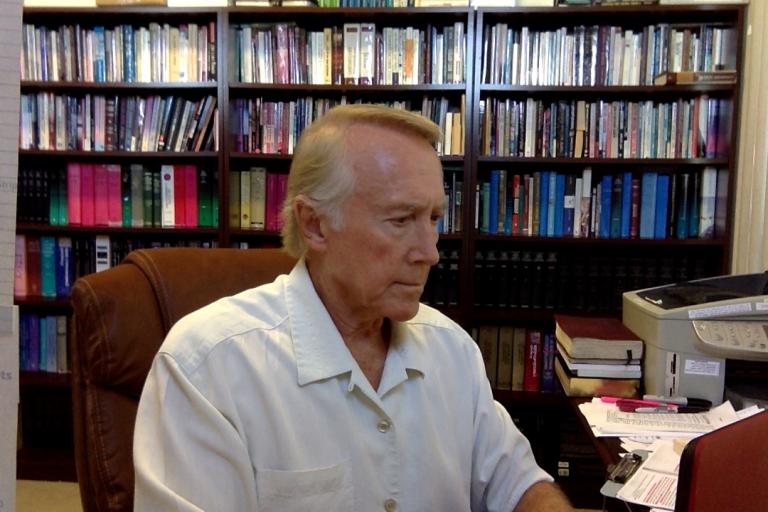Reconsidering the Trinity and Jesus Being Fully God
 About ten years later, I began to change on a more important theological subject. It was the doctrine of the Trinity and thus the deity of Christ, meaning Jesus is God. That is what nearly all Christians are taught and thus believe. Again, this change happened to me due to my interest in Bible prophecy.
About ten years later, I began to change on a more important theological subject. It was the doctrine of the Trinity and thus the deity of Christ, meaning Jesus is God. That is what nearly all Christians are taught and thus believe. Again, this change happened to me due to my interest in Bible prophecy.
One day in 1980, while I was studying in my home office, I became troubled about the deity of Christ while reading something Jesus said in his Olivet Discourse. He said concerning his yet future and literal second coming, “But of that day and/or hour no one knows, not even the angels of/in heaven, nor the Son, but the Father alone” (Matt. 24.36/Mark 13.32 NASB).
I also had been taught the corollary to the deity of Christ–the hypostatic union of Christ. This means that Jesus has two natures: a human nature and a divine nature. Church fathers had made this teaching official at the Council of Chalcedon in 451 to explain how Jesus could be both God and man, that is, a God-man. And I had learned further from pastor Thieme, as taught at Dallas Theological Seminary(DTS) , that when we read of the sayings and works of Jesus in the four NT gospels, in each case Jesus either spoke or acted from the perspective one of his two natures. In the case of this saying of Jesus about his return, Thieme taught that Jesus said that out of his human nature. That is, he did not know the time of his return in his human nature, but he did know it in his divine nature. All of what I’m saying here is very orthodox Christian teaching.
But for the first time in my life, as I was reading that saying of Jesus in my study room, I thought it made Jesus look like a liar. That is, he said he didn’t know, but he really did know in his divine nature, since being God he had to know everything about the future. I then decided that I had to make a concerted effort to find out the truth about this matter. So, when I had time I was checking out books at libraries and doing much more reading than normal.
In June, 1982, I decided that the doctrine of the Trinity is not a biblical teaching. I decided this while I was playing in my favorite golf tournament, the U.S. Open, and at my favorite golf course, Pebble Beach Golf Links in Monterey Peninsula, California. I was doing something unusual that week by staying in a private home that was owned by a Christian couple. There was a theological library in the bedroom where I was staying. Even though ten years earlier, in 1972, I had led the U.S. Open here at Pebble Beach with only twelve holes to go on the final round, and finished sixth, I was now distracted. I was playing my round each day and returning to my room to read theological books and compare what I was reading with the Bible. My attention was not focused sharply on the golf tournament as it should have been. I had something on my mind that I thought was even more important, so I couldn’t lay it aside.
I shot a good round on Friday to easily make the 36-hole cut. So, I was still there to finish the tournament. That night, I asked God what difference does it make whether or not we believe Jesus is God. I told God maybe it would be better for me to forget this study and keep quiet about what I was thinking. I was well aware of the trouble it would cause me with my Christian friends and church at home if I became non-trinitarian. And I was considering becoming an author of Christian books. Being non-trinitarian would end it for me with Christian publishers.
Back at my room on Saturday night, I read the writings of two theologians in this home library. The main one for me was Lewis Sperry Chafer, the co-founder of DTS. I was reading his four-volume set entitled Systematic Theology. I read where he expressed his strong objection to the allegations by Muslims and religious Jews that Christians worship three gods. Thus, they allege that Christianity is polytheistic, not monotheistic, because of its doctrine of the Trinity. Chafer also wrote that Judaism and Islam insisted the Trinity doctrine is the greatest theological barrier that divides Christians from both Jews and Muslims. Chafer further said that some Muslims claimed that the easiest way for Christians to convert Muslims to a biblical faith in Jesus would be for Christians to abandon their trinity doctrine.
I kept reading way past the midnight hour. I should have been asleep to prepare for the final round that Sunday. But I was so obsessed. In much prayer and inner trembling, I made my decision before God that the Bible does not expressly state that Jesus is equal in deity to that of God the Father. Thus, I was changing my belief to believing that God the Father was greater in essence and sovereignty than Jesus, making Jesus subordinate in essence to God. Yet I still clung to belief that Jesus was a lesser God. It was mainly due to two Bible verses: John 1.1c (“and the Word was God,” referring to Jesus in v. 14) and John 20.28 (Thomas confesses to Jesus, “my Lord and my God”). I was forty years old when I made this change of belief in Christology.
My Christological Journey (Part 3 of 12).
…………………..
To see a list of titles of 130+ posts (2-3 pages) that are about Jesus not being God in the Bible, with a few about God not being a Trinity, at Kermit Zarley Blog click “Chistology” in the header bar. Most are condensations of my book, The Restitution of Jesus Christ. See my website servetustheevangelical.com, which is all about this book, with reviews, etc. Learn about my books and purchase them at kermitzarley.com. My books are: The Gospels Interwoven (1987); Palestine Is Coming: The Revival of Ancient Philistia (1990); The Third Day Bible Code (2006); The Restitution of Jesus Christ (2008); Warrior from Heaven (2009); Solving the Samaritan Riddle: Peter’s Kingdom Keys Explain Early Spirit Baptism (2015).

















